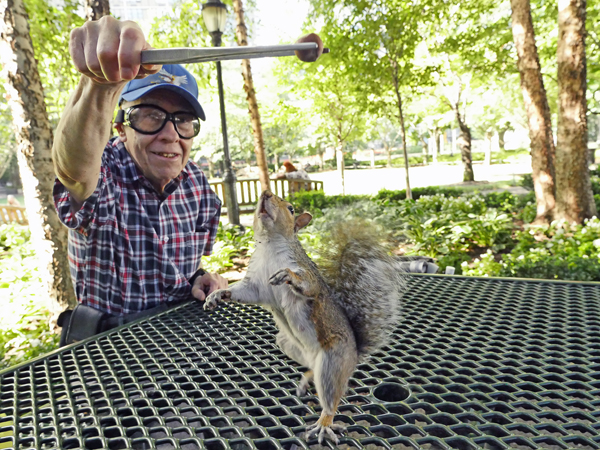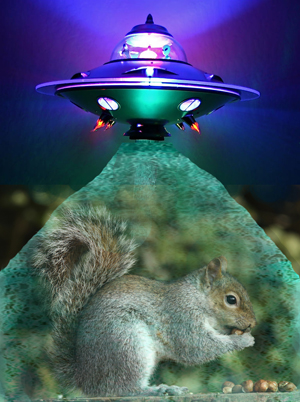
Ira “The Squirrel Man” Rosen has been feeding the fuzzy-tailed denizens of BPC’s Pump House Park for years, but he has seen the local squirrel population plummet over the past few months.
BY COLIN MIXSON
There’s something missing from Battery Park City’s parks — the squirrels.
The once-ubiquitous bushy-tailed critters have all but vanished over the past few months from many parts of the otherwise verdant neighborhood.
“We used to see a lot of squirrels, and enjoy just watching them interact, but I haven’t seen any in months,” said Dennis Gault, who lives in BPC near Tear Drop Park.
The squirrels’ disappearance from the neighborhood’s numerous natural areas, including Rector, Pump House, Tear Drop, and Rockefeller parks, was not especially conspicuous. In fact, many locals don’t realize the fuzzy nut hoarders are gone — until asked when they last saw one.
“You’re right,” said Rose Horowitz, a N. Moore Street resident who’s made a daily habit of visiting Pump House Park near Brookfield Place. “I haven’t seen any.”
Squirrel numbers in Battery Park City aren’t easy to track. The Battery Park City Conservancy does not conduct a regular squirrel census, and information regarding their disappearance is entirely anecdotal.
And when it comes to squirrel anecdotes, there’s nobody better to ask than Ira “The Squirrel Man” Rosen, an octogenarian Chelsea resident who travels to Pump House Park nearly every morning.
And when Rosen comes, he comes with nuts.
He brings peanuts, pecans, almonds, and hazelnuts to be specific — because squirrels, it seems, can be rather picky.
“Fluffy Tail’s the female. She only likes hazelnuts.” Rosen said, as he fed a more-or-less tamed squirrel her preferred variety with a pair of forceps.
Rosen started feeding squirrels in The Battery after he retired in 1991. Of the nut-loving rodents, he says, “There were a lot those days.”
He moved his squirrel-feeding hobby to BPC’s Pump House Park in 2011, after massive construction kicked off in The Battery and the racket of heavy machinery drove him — and most of the squirrels — away from the green space at the island’s tip, and up into BPC.

But times have changed. Rosen used to hand out $15 worth of nuts a day, but now that amount that lasts him the better part of a week.
In Pump House Park, where Rosen communed with at least nine squirrels each day earlier this year, only two remain. Rosen calls them Fluffy Tail and Straight Tail — they don’t get along, he said.
“There’s only two squirrels left and all they do is fight!” Rosen quipped.
Meanwhile, back in Tear Drop Park, that area’s resident squirrel — affectionately dubbed Oscar for his affinity for the trash can — has gone missing, according to Gault.
“We haven’t seen Oscar in a while,” Gault said.
It’s not easy finding a champion for squirrels in Battery Park City, and about the only resident who’s made issue of their disappearance is Community Board 1 member Tom Goodkind, who brought the matter up before the board at a meeting earlier this year.
The board largely disregarded his appeal as frivolous, said Goodkind, who was admittedly acting on behalf of his dog, a fan of chasing squirrels.
“They actually chuckled,” Goodkind said of the board. “My dog hasn’t been the same!”
Goodkind theorizes that Hurricane Sandy is to blame for the sudden squirrel drought. The superstorm’s flood waters killed many costal trees throughout the city, several of which had to be felled by the Battery Park City Conservancy for fear of falling branches crushing unwary tourists. He thinks it’s possible that a good number of squirrel nests were destroyed in the process.
But the neighborhood is hardly lacking for trees, and Goodkind’s isn’t the only theory floating around.
Unlike the parks of BPC, The Battery is now lousy with squirrels, who loot The Battery Conservancy’s carefully tended gardens for perennial seed heads and gorge themselves on food handed out by the thousands of tourists who pass through the newly renovated green space, according to the conservancy’s chief agriculturalist.
“We always have a ton [of squirrels] throughout the park,” said Josie Connell.
Now that the construction work that drove Rosen to Pump House Park five years ago has largely stopped, it’s possible that the rodents are simply migrating to The Battery and its greener pastures, Connell said.
“There’s so much food between the gardens and the tourists, and we have wrapped up a lot of construction that would have scared them off,” said Connell.
There’s one other theory, and it’s not pretty.
For five years, Brookfield Place, which leases Pump House Park, has filled the green space with rattraps disguised as rocks and containing tasty poisoned bait.
Neither the rattraps not their bait have been altered in the past five years, according Brookfield spokesman Andrew Brent, but it wasn’t until a few months ago that Rosen ever noticed a squirrel feeding from a trap.
“These traps have been here a long time, but I’ve never seen a squirrel eat from one until earlier this year,” Rosen said. “He died from the inside.”
And even before that, in April, Rosen said that Brookfield gardeners told him they found four dead squirrels in the park, lending further credence to the possibility that the wrong rodents had recently begun indulging in the appetizing rat poisons.
Brookfield’s Brent said the luxury shopping mall operator is investigating.
“We will continue to look into it,” he said.
Whatever is happening, Battery Park City and the green spaces therein have gotten a little more empty and little less active, and that, said Rosen, is a shame.
“Just trees don’t make a park, or grass or flowers,” he said. “Then you’d call Macy’s a park when they do the flower show. For me, a park needs animals. Any place without animals, it’s too quite, it’s too dead, there’s no life.”


































